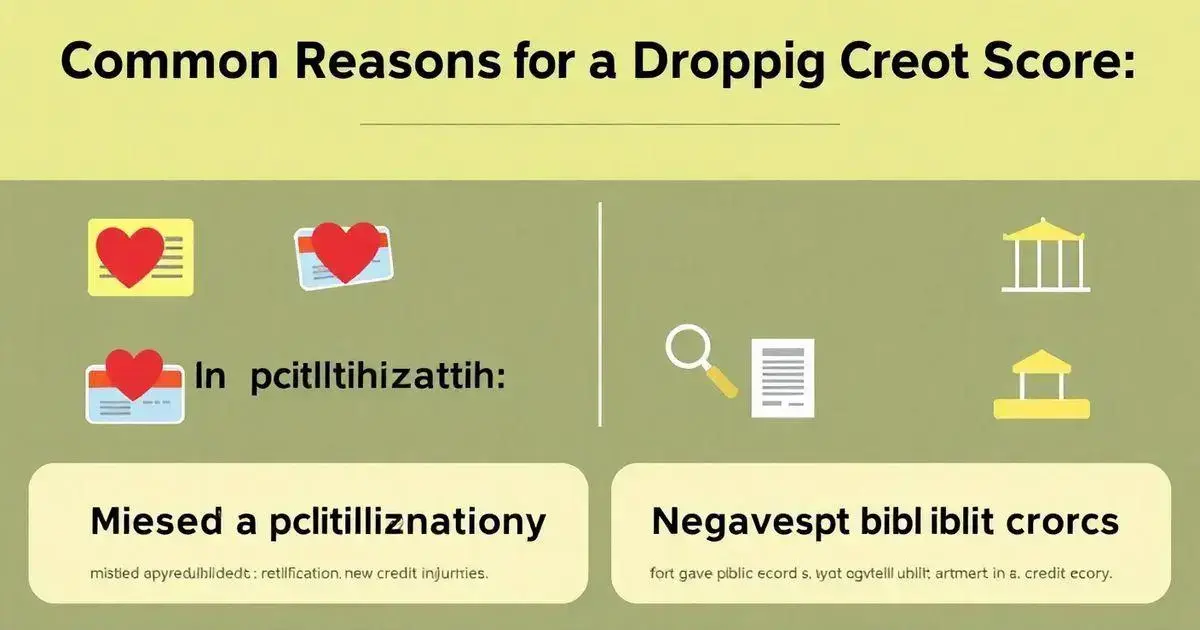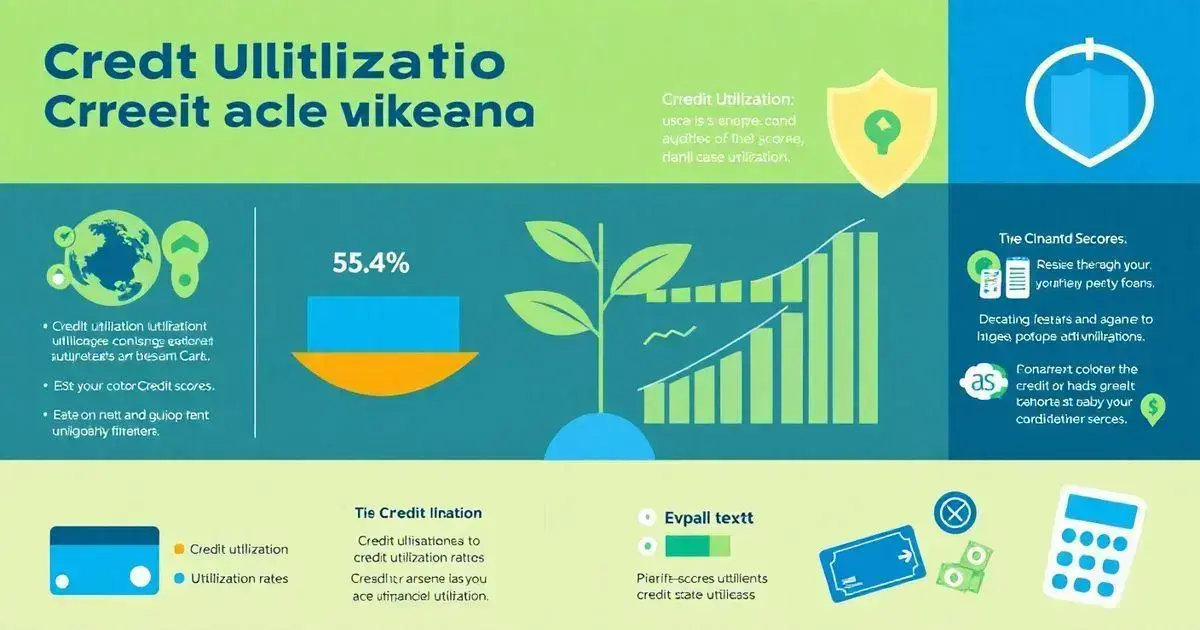Why is my credit score dropping? If you’ve noticed your score slipping, you’re not alone. A drop can be frustrating, but understanding why it’s happening is the first step to fixing it. Several factors could be at play, such as missed payments or high credit utilization.
Sometimes, it’s not just one issue but a mix of things affecting your score. The good news is that once you know the causes, you can take steps to improve your situation and regain control over your finances.
Wondering what exactly might be causing your credit score to drop? Keep reading to explore common reasons and learn how to start improving your credit today.
Understanding Credit Scores
Understanding credit scores is vital for managing your finances effectively. A credit score is a three-digit number that reflects your creditworthiness, indicating how likely you are to repay borrowed money.
Scores typically range from 300 to 850, with higher scores showing better credit health. Various factors influence your credit score, including your payment history, amounts owed, length of credit history, new credit, and types of credit used.
Why is my credit score dropping? Your payment history is the most significant factor, accounting for roughly 35% of your score. Late payments, defaults, and bankruptcies can severely damage your score. Therefore, it’s critical to make timely payments on all your financial obligations.
The amounts owed also play a crucial role, contributing around 30% to your credit score. Try to keep your credit utilization ratio (the ratio of your credit card balances to credit limits) below 30%. This shows creditors that you are not overly reliant on credit.
Why is my credit score dropping? All these aspects come together to create a picture of your financial habits. By understanding them, you can actively work to improve your credit score and achieve better financial health.
Common Reasons for a Dropping Credit Score

There are several common reasons why your credit score may be dropping. Understanding these reasons can help you take action to improve your score. One major factor is late or missed payments. When you do not pay your bills on time, it negatively affects your score. Payment history accounts for about 35% of your score, making it crucial to stay current on your payments.
Another key reason could be high credit utilization. This means you are using a large portion of your available credit. Keeping your credit utilization below 30% of your total limit is advisable to maintain a good score.
Lastly, negative marks on your credit report, such as bankruptcies or defaults, can linger for years, severely impacting your score. Regularly checking your credit report for errors is also essential, as mistakes can lead to unjustified drops in your score.
By being aware of these common pitfalls, you can take steps to protect your credit health.
How Late Payments Affect Your Score
Late payments can significantly affect your credit score. Why is my credit score dropping when you miss a payment? Your creditor may report it to the credit bureaus, leading to a drop that may last for several years.
Payment history is the most important factor in calculating your credit score, making up about 35% of the total score. Even one late payment can decrease your score by as much as 100 points or more, especially if your score was already low.
If you continue to make late payments, why is my credit score dropping even further? More severe marks, such as defaults or collections, can occur, causing even greater damage. To avoid late payments, consider setting up automatic payments or reminders. This way, you can ensure that your bills are paid on time, helping maintain your credit score.
Understanding how late payments affect your score is crucial for financial health. By making timely payments and managing your debts responsibly, you can protect and even improve your credit score over time.
The Impact of Credit Utilization

The impact of credit utilization on your credit score is significant and cannot be overlooked. Why is my credit score dropping when your credit utilization is high? Credit utilization refers to the amount of credit you are using compared to your total available credit.
It makes up about 30% of your credit score calculation. Keeping this ratio below 30% is usually recommended to maintain a healthy score.
When you utilize a high percentage of your available credit, it signals to lenders that you may be overextending yourself financially. Why is my credit score dropping in this case? This can lead to a lower credit score.
For instance, if you have a $10,000 credit limit and you consistently carry a balance of $3,000, your credit utilization would be 30%. However, if you increase your balance to $5,000, your utilization jumps to 50%, which can negatively impact your score.
To improve your credit utilization ratio, consider paying down your existing debt and not maxing out your credit cards. Additionally, you can ask for higher credit limits on your existing accounts once you have proven you can manage your credit responsibly. Managing your credit utilization wisely helps you maintain a strong credit score.
Mistakes in Your Credit Report
Mistakes in your credit report can negatively affect your credit score. Why is my credit score dropping due to errors in your report? These mistakes may include incorrect personal information, missed payments that you actually made, or accounts that do not belong to you.
Such errors can result in a lower credit score, making it harder to secure loans or favorable interest rates.
It’s important to regularly check your credit report for errors. Why is my credit score dropping when I haven’t made any mistakes? You are entitled to a free credit report from each of the three major credit bureaus once a year. By reviewing your reports, you can spot inaccuracies and take steps to correct them.
If you find an error, you should file a dispute with the credit bureau. They will investigate the issue, usually within 30 days. Providing any supporting documents can help resolve the matter effectively. Correcting these mistakes can lead to an improved credit score, enhancing your overall financial health.
Steps to Improve Your Credit Score

Improving your credit score is essential for financial health. Why is my credit score dropping and what can I do to boost it? Here are some steps you can take to improve your score. First, make sure to pay your bills on time. Payment history is the most substantial factor, making up about 35% of your score.
Next, keep your credit utilization low. Aim to use less than 30% of your available credit to show responsible management. Why is my credit score dropping if I’m using a lot of my credit? High credit utilization can negatively impact your score, so it’s important to keep it in check.
Check your credit report regularly for any errors or inaccuracies. You can obtain a free report from each of the three major credit bureaus once a year. If you find mistakes, dispute them immediately. Additionally, consider becoming an authorized user on a responsible person’s credit card. This can help improve your score without requiring you to open new credit.
Lastly, avoid taking on new debt unless necessary, as too many hard inquiries can also lower your score. Following these steps can lead to a healthier credit score over time.
When to Seek Professional Help
Knowing when to seek professional help for your credit score issues is crucial. If you have tried improving your score with no success, it might be time to talk to a financial expert.
A credit counselor can provide guidance on personal finance management. They may offer budgeting advice and strategies for managing debt.
Also, if you notice errors in your credit report that you can’t resolve yourself, professionals can assist with disputes.
For more severe issues, like bankruptcy or serious debt collection cases, consider hiring an attorney experienced in credit law.
This way, you ensure you’re making informed decisions that can significantly improve your financial situation.
Remember, seeking help is a sign of strength and a step towards better credit health.
Frequently Asked Questions about Credit Scores
What affects my credit score?
Your credit score is influenced by payment history, credit utilization, length of credit history, new credit applications, and credit mix.
How can I improve my credit score?
You can improve your credit score by making timely payments, keeping credit utilization low, and regularly checking your credit report for errors.
What is credit utilization?
Credit utilization refers to the amount of credit you are using compared to your total available credit. Keeping it below 30% is advisable.
How often should I check my credit report?
It’s best to check your credit report at least once a year for errors or inaccuracies, which you can do for free from each major credit bureau.
When should I consider seeking professional help?
You should consider seeking professional help if you are unable to improve your score on your own or if you encounter serious credit issues like bankruptcy.
Can late payments affect my credit score?
Yes, late payments can significantly lower your credit score and can stay on your credit report for up to seven years.
